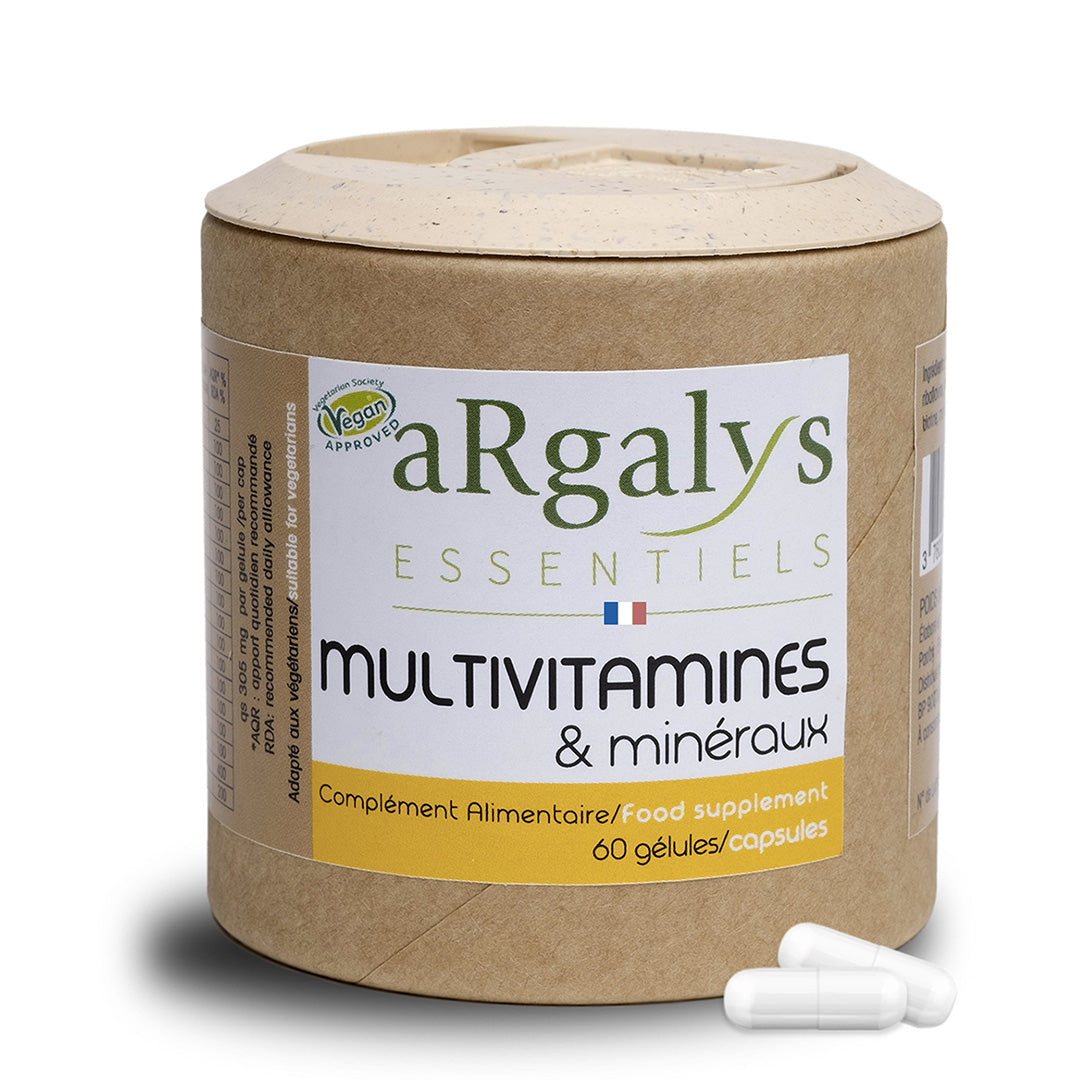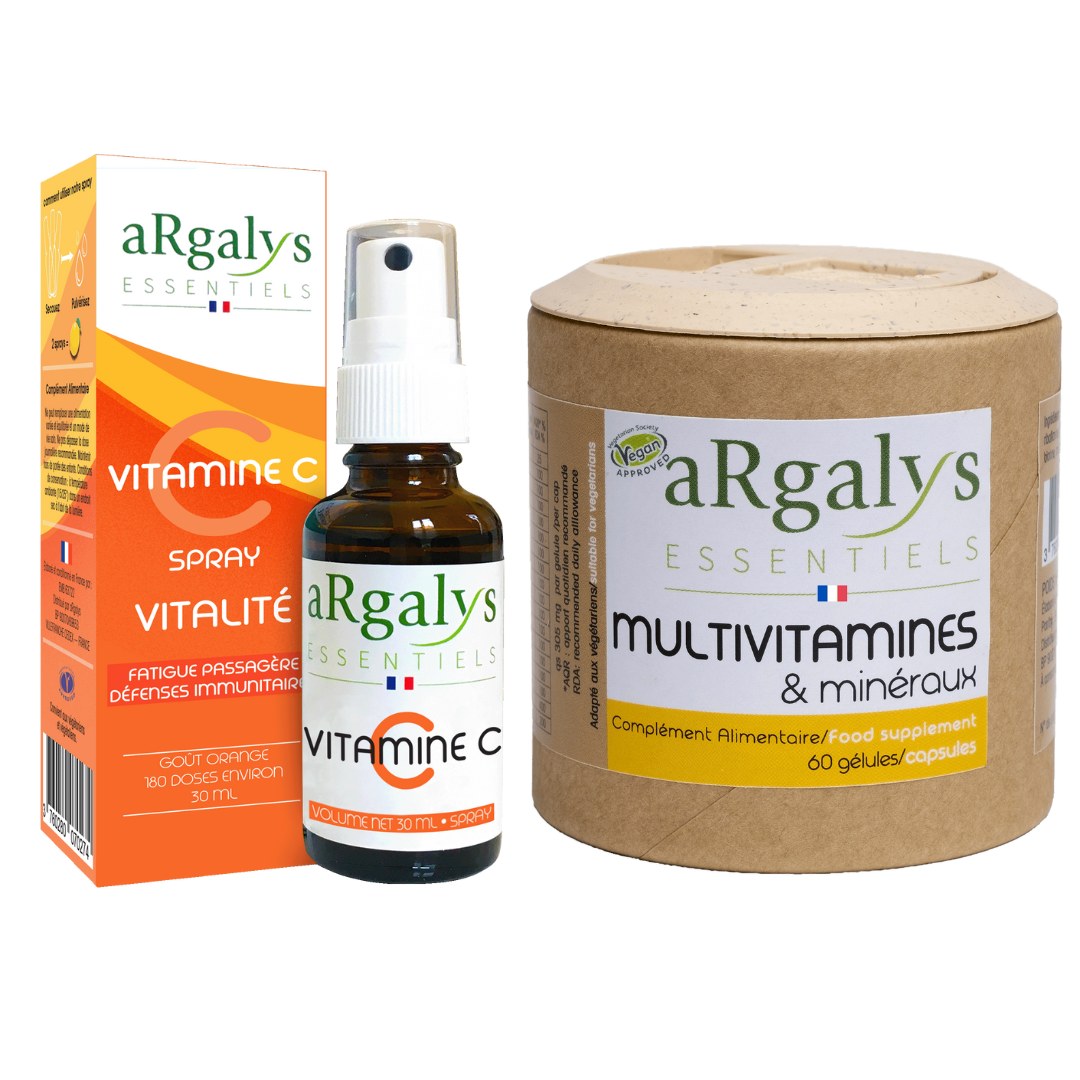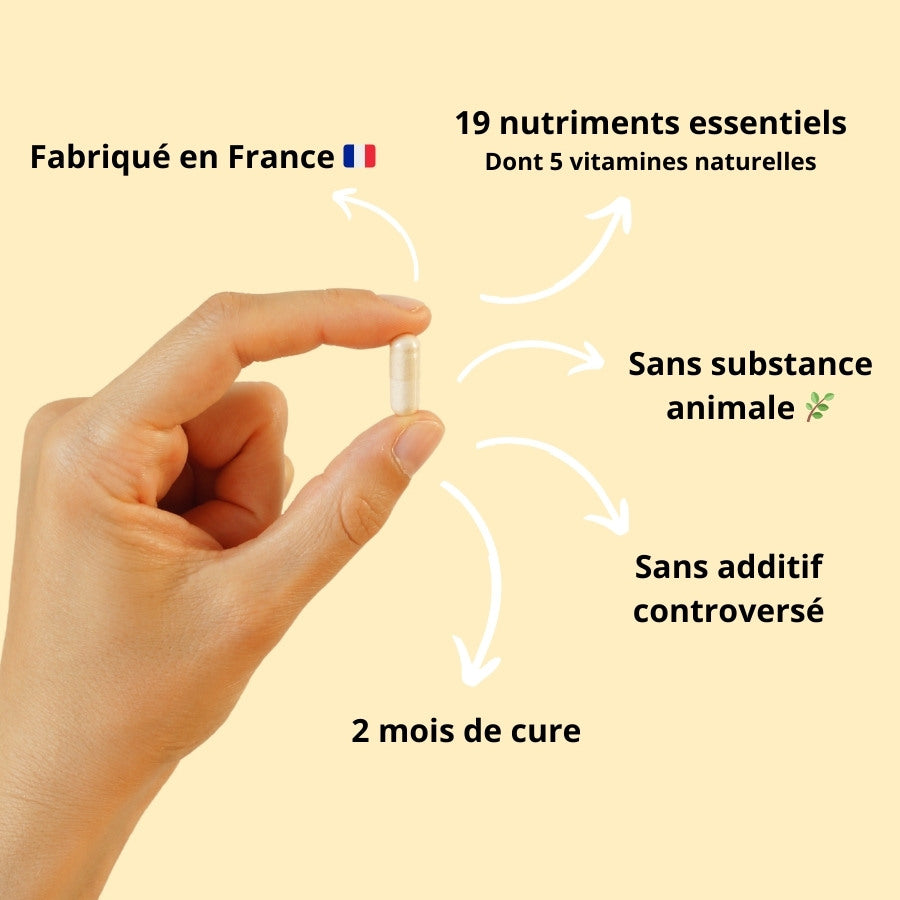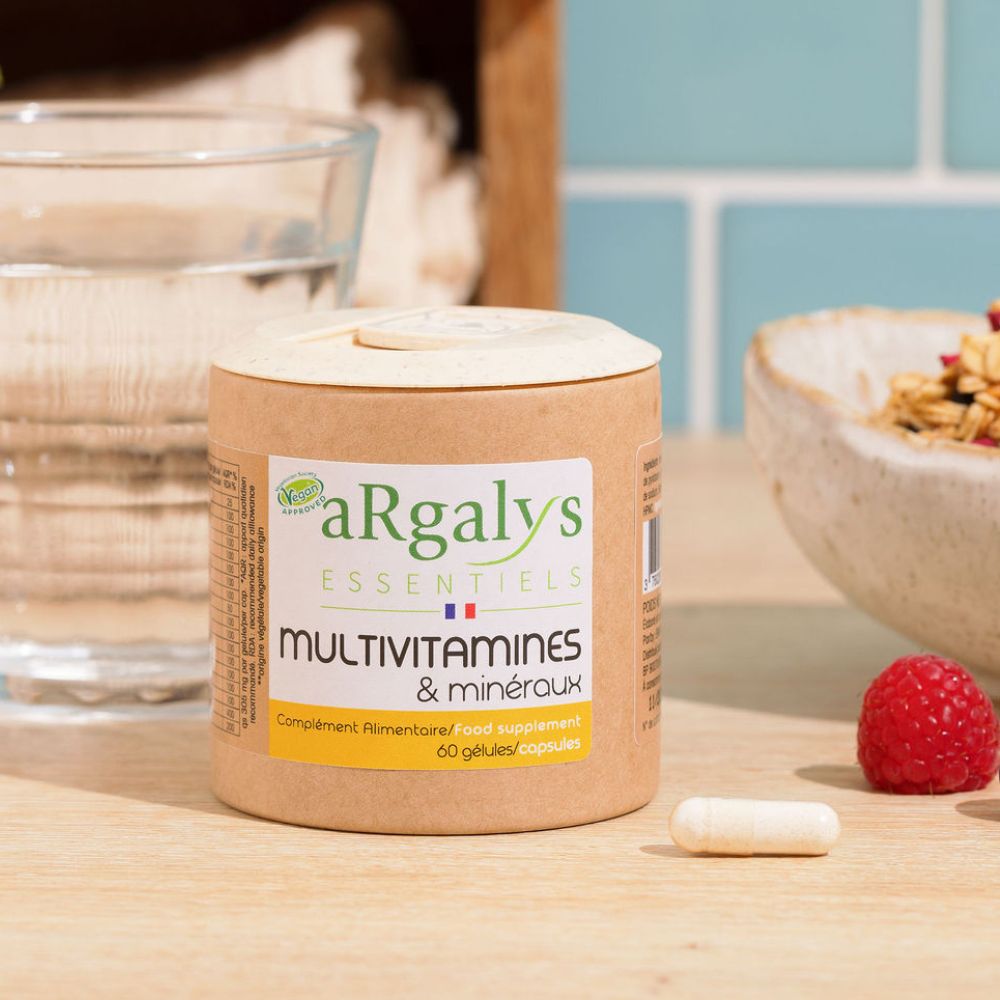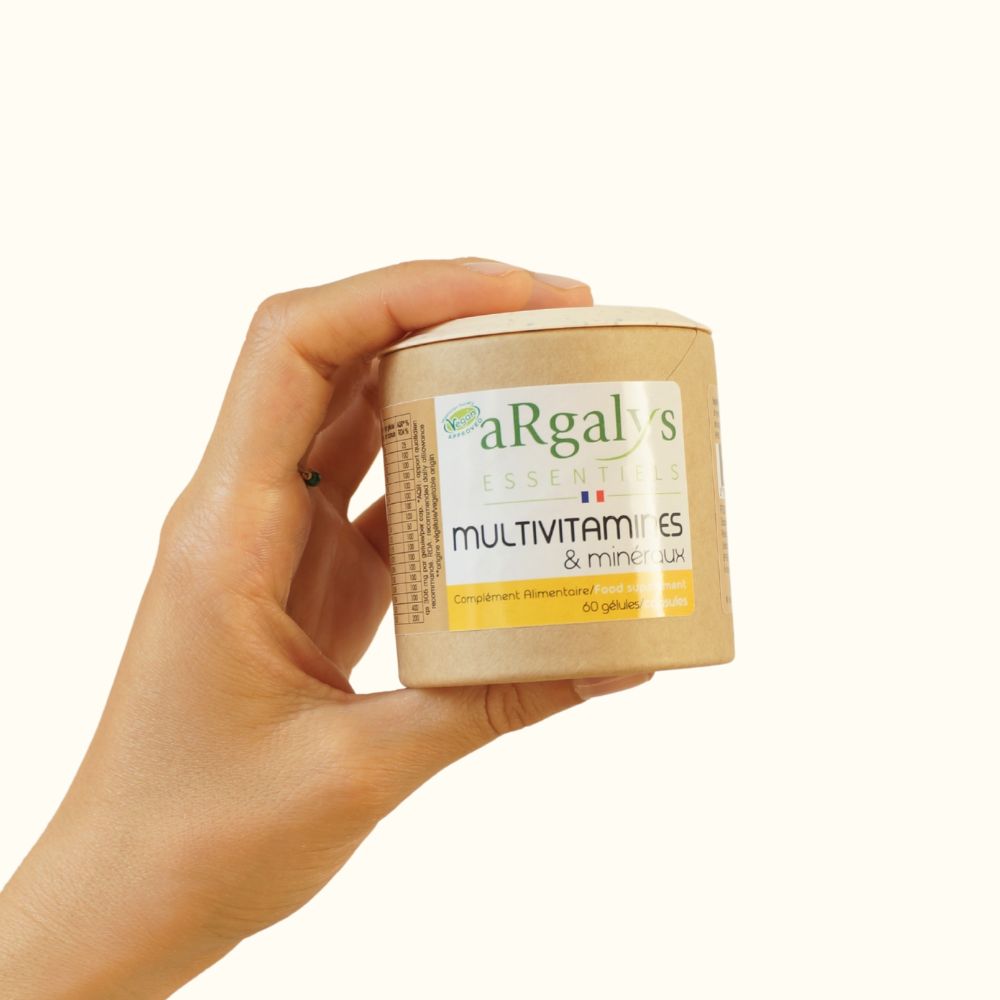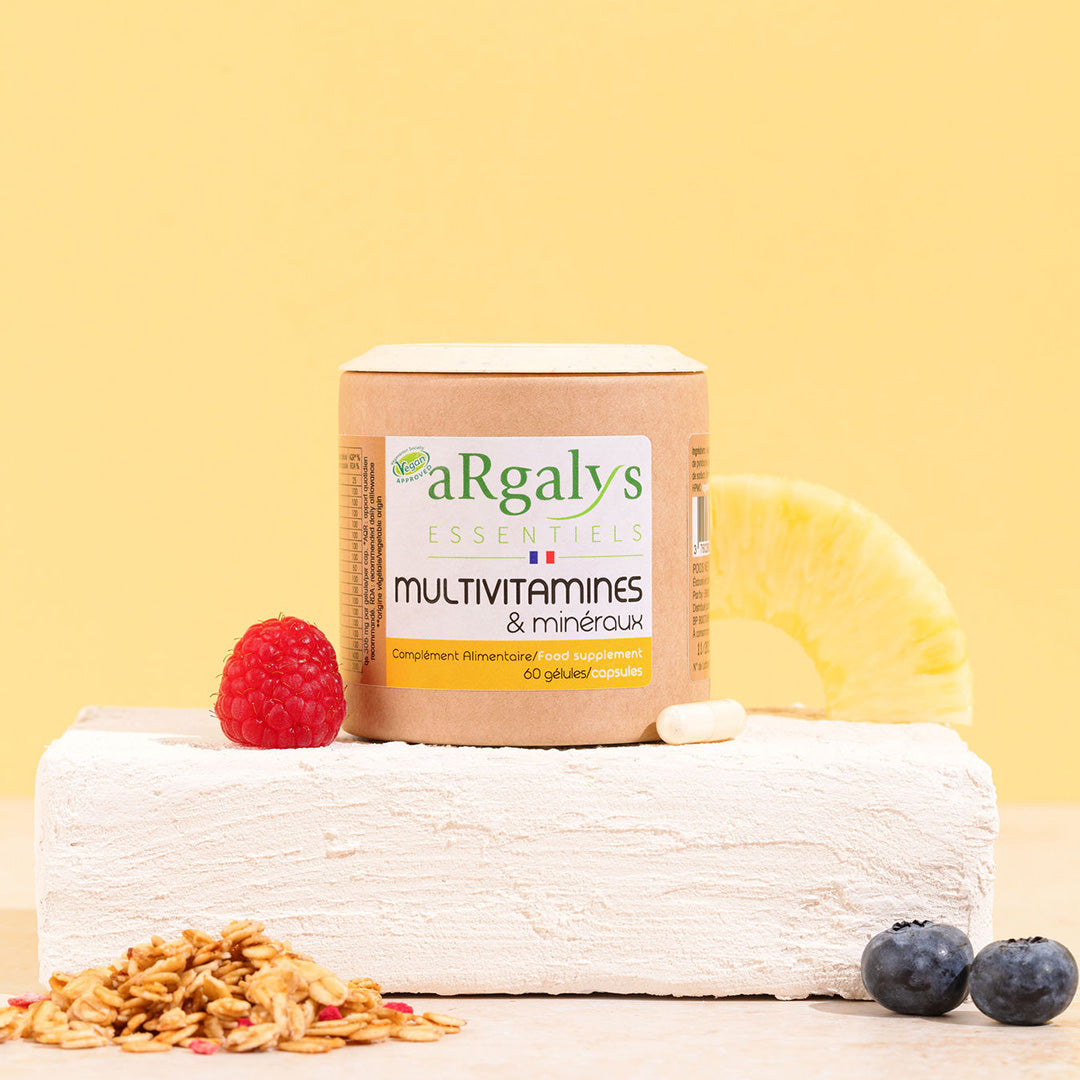


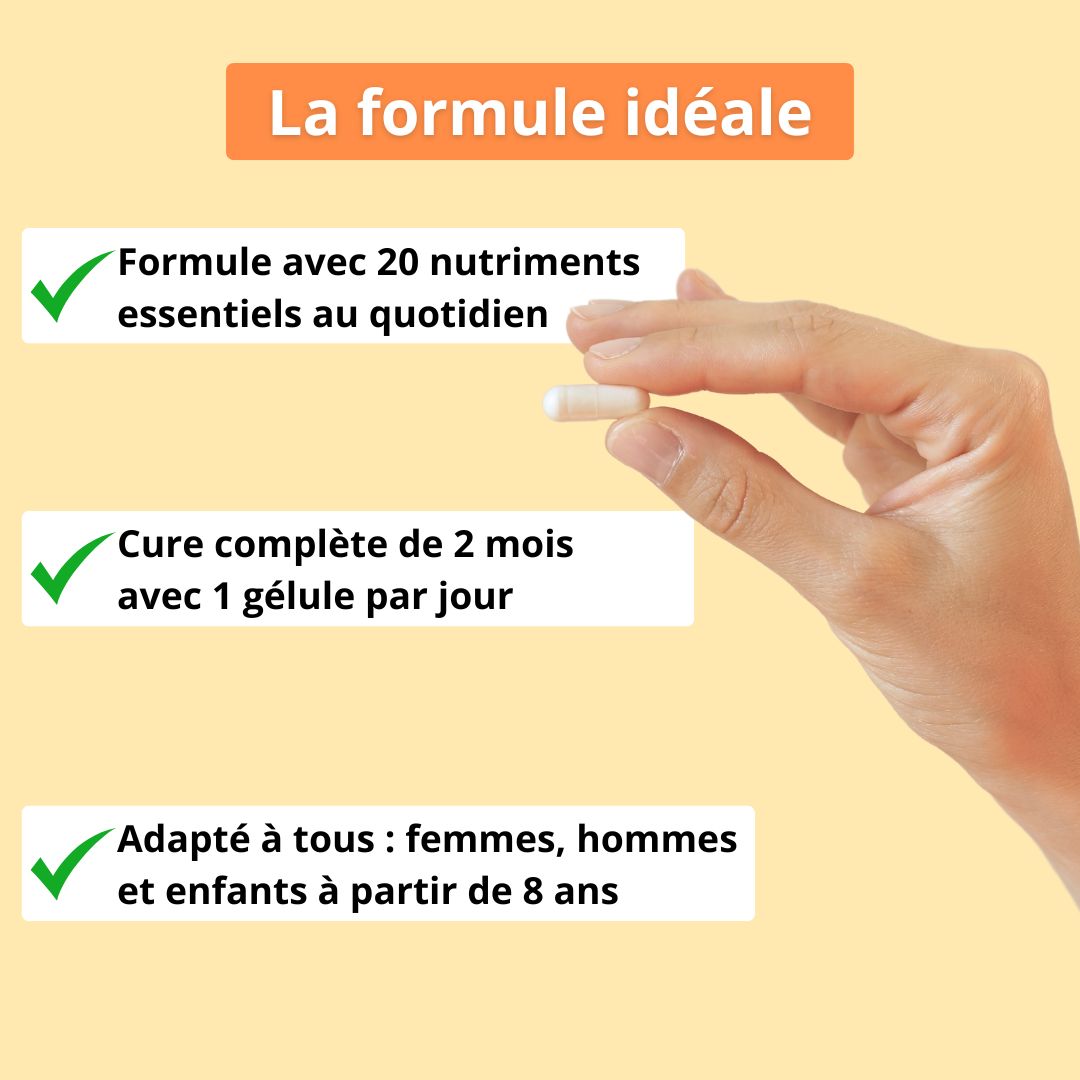

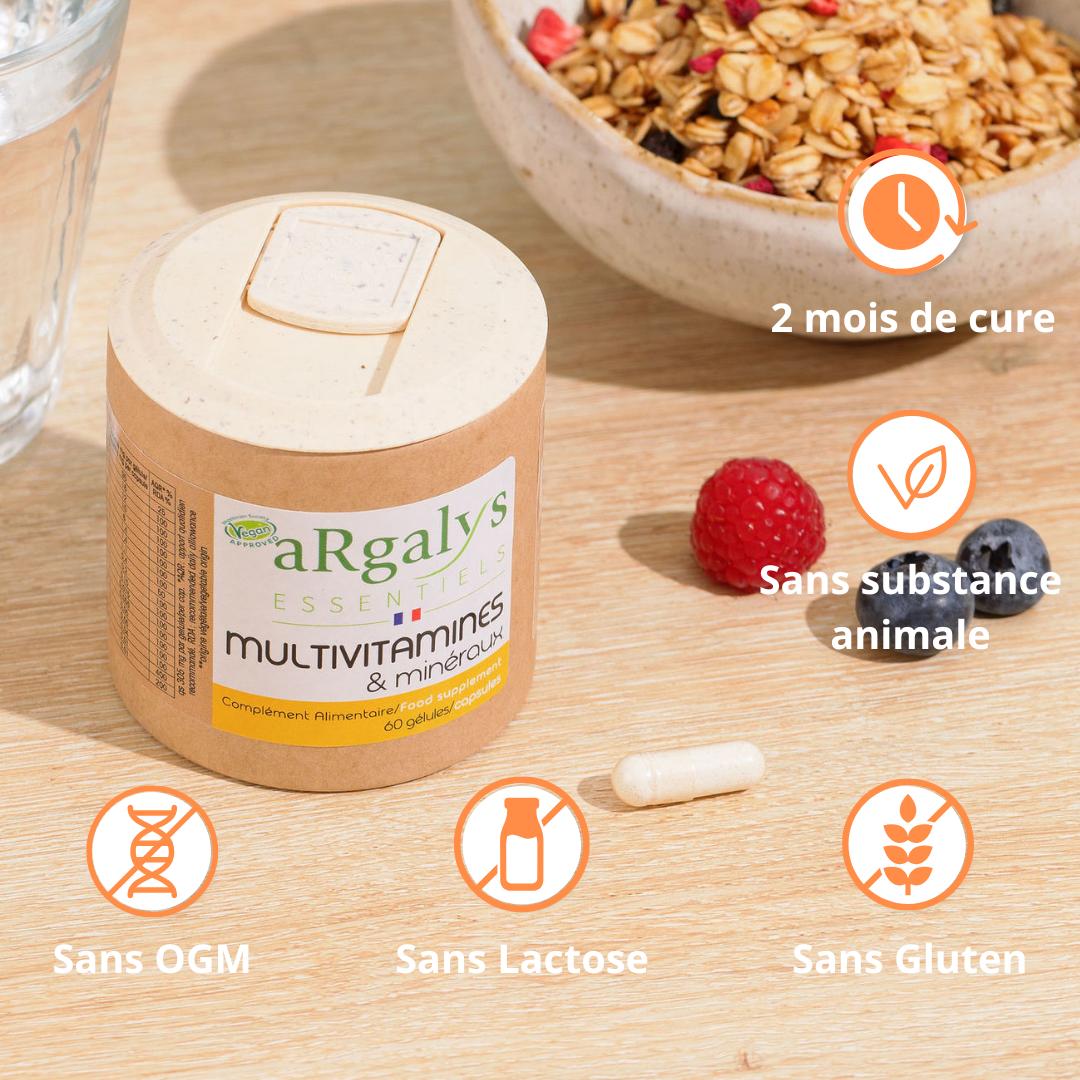
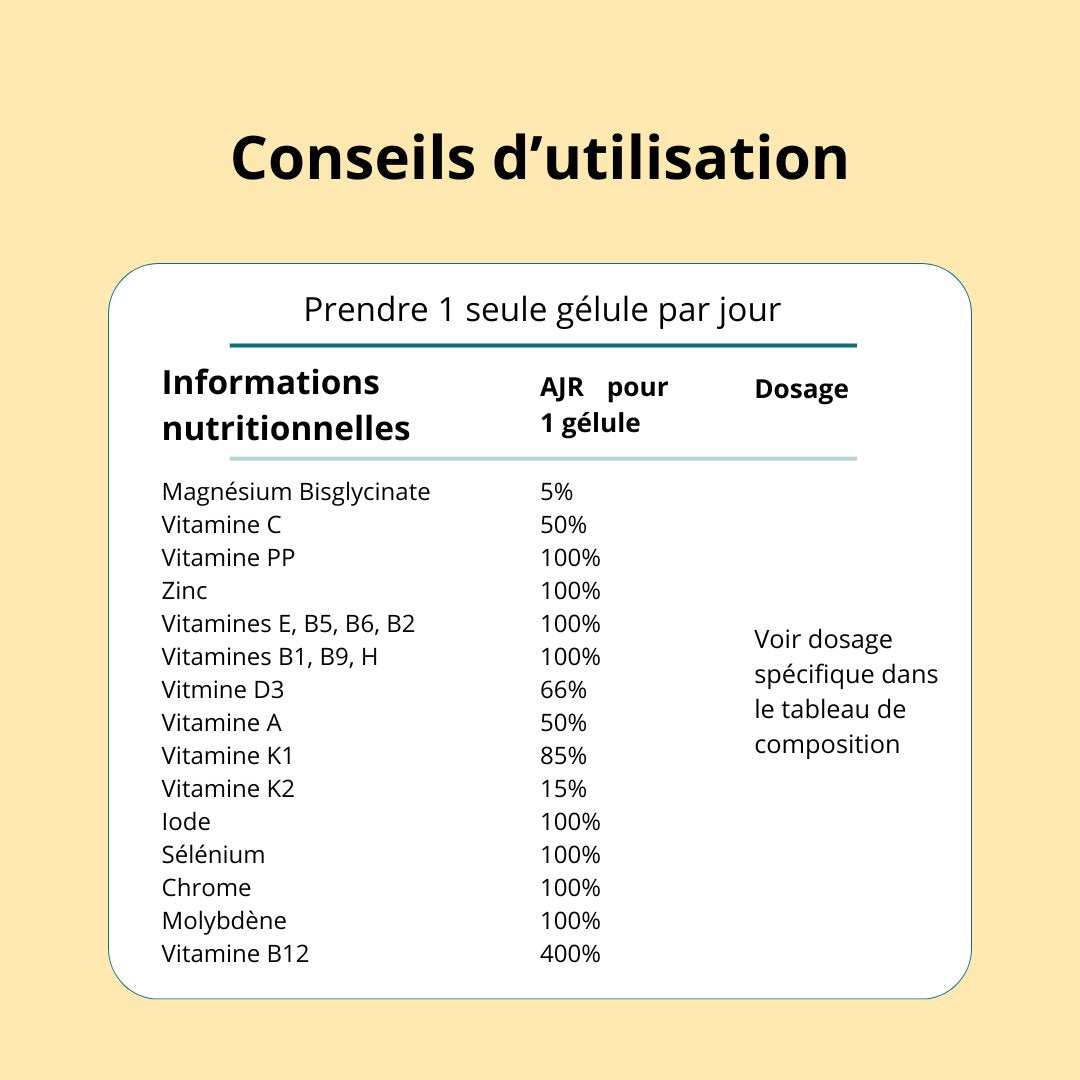

Multivitamins and minerals
- 19 essential bioactive nutrients
- Vitamins
- Minerals and plant extracts
- Stimulates immune defenses
- Suitable for pregnant and breast-feeding women
- Vegan certified
Even with a balanced diet, it's not always easy to get enough vitamins and minerals. That's why we've developed a formula with 19 active nutrients (vitamins, minerals and plant extracts), essential for your daily routine! ☀️
En savoir plus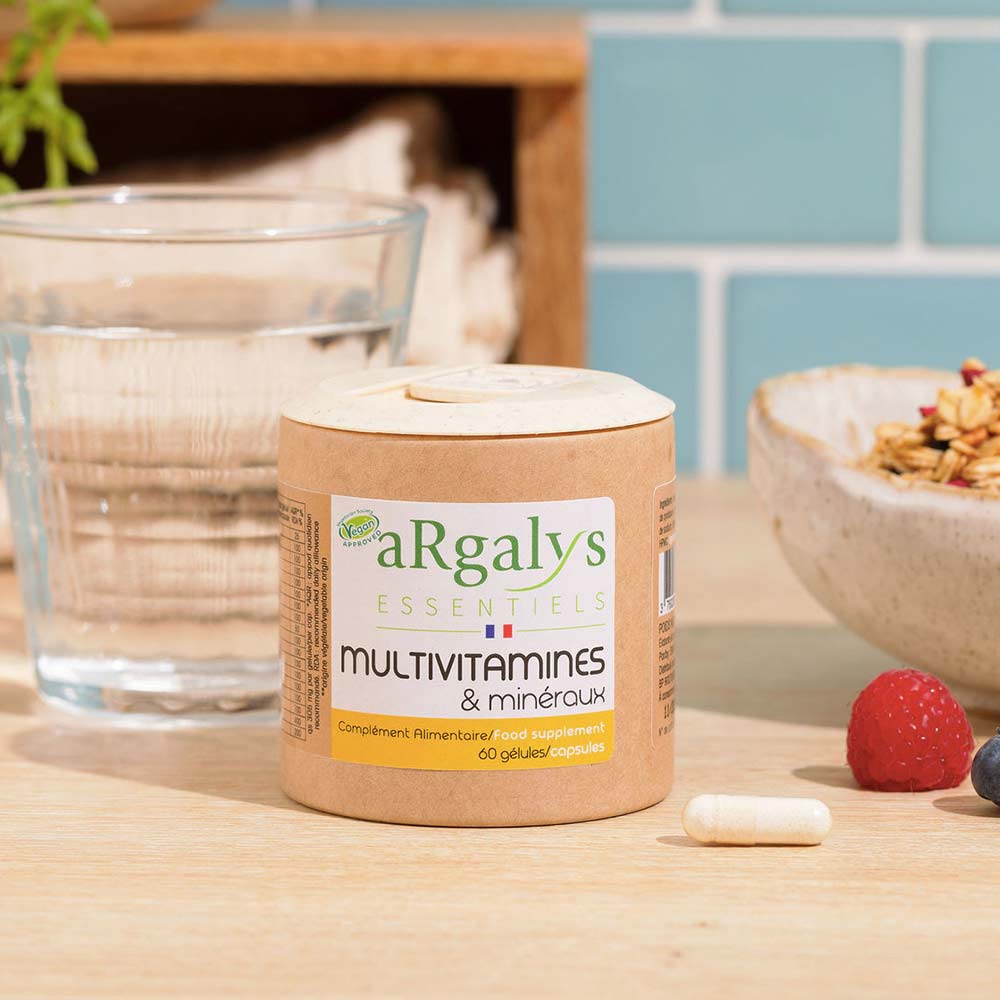
Our lifestyles and our eating habits do not always allow us to havea sufficient intake of vitamins & minerals.
However, they are essential to our body, all year round.
19 essential active ingredients in a single capsule:
Our Multivitamin and Mineral supplement focuses on nutrients that are difficult to find in food for extensive coverage of daily needs, in complete safety.
It concentrates 19 nutrients with reinforced vitamin B12 and D3 contents but also vitamin K for calcium fixation, and minerals (magnesium, zinc, iodine, selenium, chromium, molybdenum)!
A formula for everyone:
Immunity, energy, stress, cardiac and mental functions, joint comfort... our formula offers a very broad field of action.
Our Multivitamins and minerals are suitable for both women and men, and provide support during all periods of life:
- Pregnancy and breastfeeding,
- Sports
- Periods of fatigue
- Immune weakness etc.
Ingrédients
Magnesium
It is an essential mineral for the proper functioning of the body. It participates in the neuromuscular transmission of nerve impulses and plays an important role in many enzymatic reactions. Its association with vitamin D allows the prevention of osteoporosis.
Magnesium also helps reduce symptoms of fatigue.
Vitamin B12
Absent from plant foods, this vitamin must absolutely be supplemented.
It plays a fundamental role in the synthesis of body proteins and in the functioning of the brain and nervous system.
Sub-deficiencies in adults resulting in states of fatigue and nervous fragility.
In young pregnant women and seniors, it is not possible to ignore vitamin B12 supplementation equivalent to 100% of daily needs (adult RDA). Consumer studies (Oxford-Epic, University of Brussels) show that Vegans are significantly deficient in vitamin B12.
Vitamin D3
Indispensable for bone fixation of calcium is of non-animal origin.
A systematic intake guarantees good ossification, especially when calcium intake is limited, during winter periods (exposure to the sun allows the body to synthesize vitamin D), and for sensitive populations (young people, seniors, women speakers).
Vitamin A
The beneficial effects of vitamin A are numerous at the right doses. It is essential for the proper functioning of vision and gene expression, in particular for all the mechanisms of development and cell renewal from fertilisation of the embryo to the end of life. The molecular form of vitamin A is retinol (found in animal tissues, e.g. calf's liver), but there are also plant sources of pro-vitamin A: carotenes, mainly beta-carotene. Beta carotene differs from retinol in two important ways: its antioxidant (anti-free radical) properties and the fact that it is harmless during pregnancy.
https://www.anses.fr/en/content/vitamin-provitamin-carotenoids
Our vitamin A is now limited to 50% of the RDA and now in the form of Beta-carotene. This change was made to secure the supplementation of pregnant women.
This dosage excludes any risk of overdose for the young fetus (first 12 weeks). Indeed, pediatricians warn against possible risks related to overdose of Retinol (the other form of vitamin A) which can cause malformations of the fetus during its first twelve weeks (reason for which the consumption of liver or liver oil is strongly discouraged for mothers during this period).
What about beta-carotene for smokers?
Based on the scientific results available, EFSA (the European Food Safety Authority) has concluded that beta-carotene does not increase the risk of lung cancer in heavy smokers at doses of less than 15 mg per day (and with regular intake over several years). In our formula, vitamin A is dosed at 0.4 mg, 37 times less than the maximum recommended dose. There is no risk associated with a moderate intake of 0.4 mg/day of vitamin A for smokers and ex-smokers.
*In France, for adults aged 18 to 79, the average daily intake of beta-carotene from food (fruit, vegetables, etc.) is 2.69 mg (source: ANSES).
Other vitamins
(E, K1 for fat-soluble, B1, B3, B5, B6, H for water-soluble) are provided safely because it is difficult to know the actual use of vitamins present in food.
Either because they are degraded by the food preparation process (cooking in particular).
Either because their actual absorption in the intestine is low and variable (and linked to the presence of certain other parameters: lipids, enzymes, intestinal flora).
Except for vitamin B12, the storage of water-soluble vitamins in the body is low, so it is important to have assured daily intakes. When the recommended dose is reached (one capsule/day), there is no risk of hypervitaminosis.
Trace elements
Iodine, Selenium, Molybdenum and Zinc are trace elements present in many enzymatic reactions. Provided for safety for sensitive profiles (young people, seniors, pregnant women), they do not represent any risk of overdose or kidney fatigue at the recommended dose.
| Assets | Dose per capsule (1 capsule/day) | %NRV (adult) | |
| Magnesium | 95 mg | 25% | |
| Vitamin B3 | 16mg | 100% | |
| Zinc | 10 mg | 100% | |
| Vitamin E | 12 mg | 100% | |
| Vitamin B5 | 6mg | 100% | |
| Vitamin D3 | 0.010 mg | 200% | |
| Vitamin B6 | 20 mg | 25% | |
| Vitamin B2 | 1.4 mg | 200% | |
| Vitamin B1 | 1.1 mg | 100% | |
| Vitamin A (beta-carotene) | 0.4 mg | 50% | |
| Vitamin B9 | 0.2 mg | 100% | |
| Vitamin K1 | 0.0375 mg | 50% | |
| Vitamin K2 | 0.0375 mg | 50% | |
| Vitamin H (Biotin) | 0.05 mg | 100% | |
| Iodine | 0.15 mg | 100% | |
| Selenium | 0.05 mg | 100% | |
| Chromium | 0.04 mg | 100% | |
| Molibdene | 0.05 mg | 100% | |
| Vitamin B12 | 0.010 mg | 400% |
 04 74 03 98 80
04 74 03 98 80





